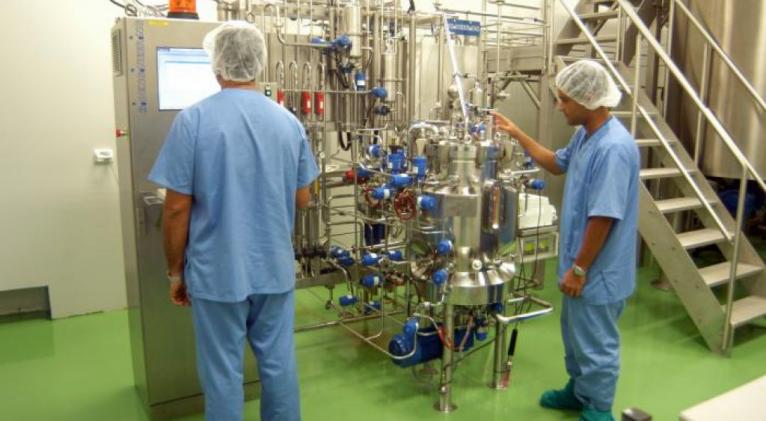CUBA - U.S.: Lives waiting for a visa
especiales

Despite the restrictions and impact of the blockade, Cuba has developed world class scientific centers. Photo: Fonticoba Gener
CAR T-cell therapy, effective against several types of cancer, can make a life and death difference for patients in critical condition. The United States is a leader in the field, and only a few developed countries have the technology to provide it.
The American Association for the Advancement of Science (AAAS) awarded a fellowship to Darel Martínez, a specialist at Cuba's Center for Molecular Immunology (CIM), to learn about the treatment at an internationally recognized center in the United States.
"The objective was to begin a project to generate CAR T-cells in Cuba and establish collaboration with the leading groups in this arena," the 35 year-old PhD biologist, who studied at the University of Havana, told Granma.
Martínez was set to travel to the United States last October, but the suspension of U.S. consular services in Cuba has prevented him from obtaining the necessary scientific collaboration visa.
Based on an unfounded and scientifically implausible pretext, this past September the State Department withdrew the majority of its diplomatic staff in Cuba and almost completely suspended the issuing of visas, with the exception of those for officials or diplomats. At the same time, the U.S. demanded that 17 Cuban staff members at the Cuban mission in Washington leave the country.
After three months of investigations, U.S. authorities themselves acknowledged that there is no evidence to substantiate "sonic attacks" on diplomats in Havana, the alleged reason for these drastic steps.
Nevertheless, the unjustified, unilateral measures remain in place, negatively affecting academic, scientific, sports, cultural, and family exchanges.
"CAR T-cell therapy is one of the most novel and costly to fight cancer. Thus far, it has had great results in cases of leukemia," the Cuban scientist stated.
The benefits for Cuba, he explains, would be introducing the platform and with that the products, which have already been registered here, as well as the possibility of developing others based on the country's experience in treating cancer.
"While for the American side, they could benefit from the CIM's experience in the production of monoclonal antibodies, which are necessary for the generation of
CAR T-cells," he noted.
Martínez recalls that the Trump administration's decision to suspend the issuing of visas arrived precisely when he had just submitted his paperwork to the U.S. embassy in Havana, "Instead of starting in October, we're still struggling to get the collaboration going."
In accordance with the new procedure established by the United States, Cubans interested in applying for a non-immigrant visa - a J1 in the case of Martínez, for scientific collaboration - can be processed in any U.S. consulate anywhere in the world, except Havana.
The Cuban scientist was obliged to notify his U.S. counterparts of the situation, who were in turn forced to incur extra expenses to complete the visa process in another country. All this with no guarantee that the visa will in fact be granted.
"They were wiling to cover these costs, which, of course means spending money that could have been used to finance my work or that of other persons," Martínez commented.
His case is not unique and the impact has been felt in other sectors, including culture and sports.
Seven Cuban athletes were not able to attend the World Weightlifting Championship in Anaheim, held last year, as a result of the suspension of consular services here.
Likewise, the uncertainty generated by the U.S. government's unjustified warning on travel to Cuba, one of the safest countries in the world, has affected visits by collaborators to the island.
Several scientists were scheduled to visit the Pedro Kourí Institute of Tropical Medicine (IPK), one of Cuba's most prestigious scientific centers, but cancelled their plans under pressure from U.S. authorities.
The Trump administration has "probably closed the door" on many Cuba-U.S. joint projects, according to John Van Horn, a neuroscientist at the University of Southern California, in Los Angeles.
The scientists from the U.S. were interested in the IPK's research on arboviruses, pathogens transmitted by mosquitoes that include Zika, Chikungunya, and dengue.
The U.S. National Institute of Health had even approved, this past June, four grants of up to 50,000 USD each, to support these projects. Nevertheless, the new circumstances obliged them to cancel the financial help, because of "difficulties with getting the money to Cuba."
"By affecting the functioning of both (embassies), exchanges of all kinds between Cuba and the United States are being affected, be they cultural, sports-related, or scientific, but also family interactions and relations," said Cuban diplomat Josefina Vidal recently.
Despite the restrictions and impact of the blockade, Cuba has world class scientific centers and has produced its own medical treatments, largely unavailable in other undeveloped countries.
Among its most significant accomplishments, Cuba now cures 80% of children with leukemia, the most common form of childhood cancer. Likewise, it was the first country to be certified by the World Health Organization as having eliminated mother-infant transmission of HIV and syphilis.













Add new comment